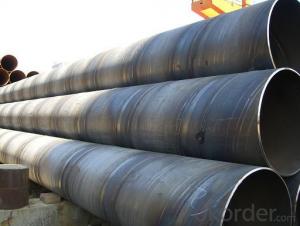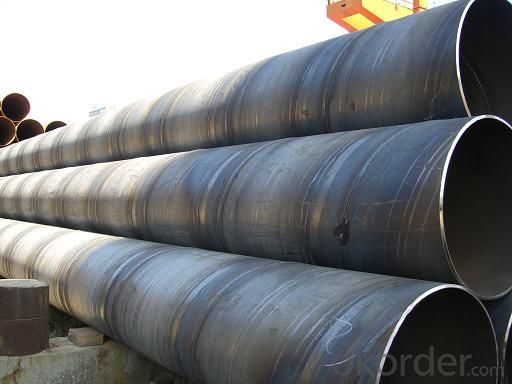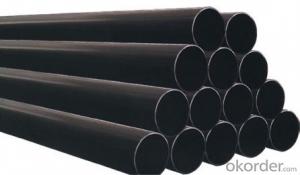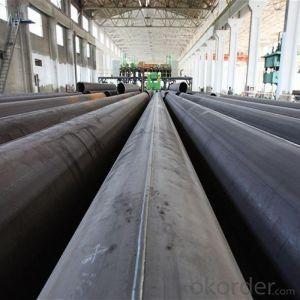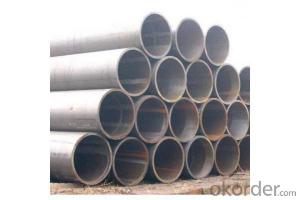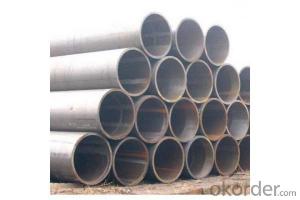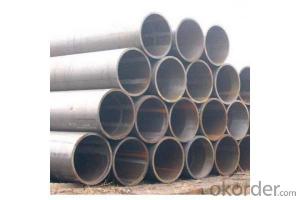API SSAW LSAW CARBON STEEL PIPE LINE OIL GAS PIPE 16''
- Loading Port:
- Tianjin
- Payment Terms:
- TT OR LC
- Min Order Qty:
- 1 m.t.
- Supply Capability:
- 3000 m.t./month
OKorder Service Pledge
OKorder Financial Service
You Might Also Like
Packaging & Delivery
Packaging Detail: | standard export packing or as customer's requirement |
Delivery Detail: | within 10 - 30 days |
Specifications
Spiral Welded Steel Pipes and Tubes
1.Material:Q195-Q235
2.Length:1-12m
3.WT:1.0-14mm
4.O.D.:20-273mm
Spiral Welded Steel Pipes and Tubes
Product Description:
1.Material : Q235,Q345,L245,L290,L360,L415,L450,L485,GrB,X42,46,X52,X56,X60,X65,X70,X80,X100
2,Standard: SY/T5037-2000,GB/T9711-2011,API Spec 5L PSL1/PSL2,ASTM A252\A53,ISO3183,DIN17172,EN10217,JIS G3457,AWWA C200,ASTM A139,ASTM A671,ASTM A672
3.Wall thickness: 3.0mm-30mm
4.Outer diameter: φ168mm-3020mm
5,Length: 5m-12m or as your requirement
6,Corrosion protection standard: DIN30670,DIN30671, AWWAC210, AWWA C203, SY/T0413-2002,SY/T0414-2002
7,Application: Oil, gas, natural gas, water pipe, thermal electricity pipe, steel structure engineering, etc
Q195-q345 Material Steel Pipe's Materials
Elements | Chemical Compsition% | Mechanical Property | ||||||
C% | Mn% | S% | P% | Si% | Yield Point (Mpa) | Tensile Strength(Mpa) | Elongation | |
Q195 | 0.06-0.12 | 0.25-0.50 | <0.050< span=""> | <0.045< span=""> | <0.030< span=""> | >195 | 315-430 | 32-33 |
Q215 | 0.09-0.15 | 0.25-0.55 | <0.05< span=""> | <0.045< span=""> | <0.030< span=""> | >215 | 335-450 | 26-31 |
Q235 | 0.12-0.20 | 0.30-0.70 | <0.045< span=""> | <0.045< span=""> | <0.030< span=""> | >235 | 375-500 | 24-26 |
Q345 | <0.20< span=""> | 1.0-1.6 | <0.040< span=""> | <0.040< span=""> | <0.55< span=""> | >345 | 470-630 | 21-22 |
Packaging & Delivery
Packaging Detail: | Normal exporting packing,in container or bulk vessel or as per clients' request |
Delivery Detail: | 2 months after confimed contract |
Specifications
Large Diameter API 5L X70 PSL2 LSAW Steel Pipe
Grade: X42, X46, X50, X52, X60, B, C
OD: 1.5"-28"
WT: SCH10-SCH160
Large Diameter API 5L X70 PSL2 LSAW Steel Pipe
Specifications:
u Standard: API 5L
u Grade: B, C, X42, X46, X50, X52, X56, X60, X65, X70, X80
u OD: 1.5"-28"
u WT: SCH10-SCH160
u Length: 5-12m
u Ends Finish: plain end, bevel end, grooved end
u Surface Treatment: bare, black varnished, oiled finish, red color, anti-corrosion, 3PE, FBE or epoxy coating
u Technique: hot rolled or cold drawn
u Application: api 5l steel pipe for conveying oil, water, gas
u Invoicing: based on theoretical weight or actual weight
u Payment Terms: L/C at sight, T/T or Western Union
u Trade Terms: FOB, CFR, CIF
u Certification: ABS manufacturing assessment, ABS design assessment, API 5CT, API 5L, DNV manufacturer certificate, ISO9001 quality management system certificate, ISO14001 environment management system certificate, GB/T28001 occupational health and safety management system certificate, A1 class manufacturing license of special equipment certificate, CCS, GL, LR, SGS, TüV, PDE
- Q: What is the difference between API 5L and ASTM A53 steel pipes?
- API 5L and ASTM A53 steel pipes differ mainly in their specifications and intended applications. API 5L is a standard for seamless and welded steel pipes used for transportation of oil, gas, and water in the petroleum and natural gas industries. It specifies requirements for the manufacture of two product specification levels (PSL1 and PSL2) of seamless and welded steel pipes. On the other hand, ASTM A53 is a standard specification for seamless and welded black and hot-dipped galvanized steel pipes used for mechanical and pressure applications. While both standards have similarities, they have different scopes and requirements, making them suitable for distinct purposes in different industries.
- Q: How do you determine the required support spacing for steel pipes?
- Various factors, including the diameter of the pipe, the strength of the material, the operating conditions, and local building codes and regulations, determine the required support spacing for steel pipes. When considering the diameter of the pipe, it is crucial to note that larger pipes generally need more frequent support to prevent excessive deflection and sagging compared to smaller pipes. The strength of the material is also a significant consideration, as pipes with greater strength can span longer distances without requiring additional support. The operating conditions of the pipe, such as the type of fluid being transported and the temperature, also play a role in determining the necessary support spacing. For instance, pipes carrying heavy or corrosive fluids may require more frequent support to prevent excessive stress and potential failure. Local building codes and regulations often provide specific guidelines for the minimum support spacing of steel pipes. These regulations take into account factors such as the diameter of the pipe, the strength of the material, the operating conditions, as well as safety and structural requirements. To accurately determine the required support spacing for steel pipes, it is essential to consult relevant codes, standards, and engineering guidelines. Additionally, working with qualified engineers and professionals experienced in pipe design and installation will ensure that the support spacing meets all necessary requirements, ensuring the safe and efficient operation of the piping system.
- Q: How are steel pipes used in building foundations?
- Steel pipes are commonly used in building foundations to provide structural support and stability. They are often driven into the ground to create deep foundation systems, such as pile foundations, which can bear heavy loads and transfer them to the underlying soil or rock. These pipes are also utilized in various types of foundation construction, such as caissons and drilled shafts, to ensure strength, durability, and resistance to ground movements.
- Q: What is the average lifespan of steel pipes in different applications?
- The average lifespan of steel pipes in different applications can vary significantly depending on factors such as the type of application, the environment it is exposed to, and the level of maintenance. However, in general, steel pipes can last anywhere from 20 to 100 years or more, making them a durable and reliable choice for various industries and infrastructure projects.
- Q: How are steel pipes recycled?
- Steel pipes are recycled through a multi-step process that involves collection, sorting, cleaning, and melting. First, the used steel pipes are gathered from various sources such as construction sites or industrial facilities. Then, they are sorted based on their size, shape, and quality. Next, any contaminants or coatings are removed from the pipes through cleaning and stripping processes. Finally, the cleaned pipes are melted down in a furnace, and the molten steel is formed into new pipes or other steel products. This recycling process reduces the demand for new raw materials and helps conserve energy and resources.
- Q: What are the different types of steel pipe coatings for marine applications?
- There are several types of steel pipe coatings used for marine applications, including fusion-bonded epoxy (FBE) coatings, three-layer polyethylene (3LPE) coatings, three-layer polypropylene (3LPP) coatings, and concrete weight coatings (CWC). These coatings provide protection against corrosion, abrasion, and other environmental factors, ensuring the longevity and durability of the steel pipes in marine environments.
- Q: What are steel pipes used for?
- Steel pipes find extensive use in a diverse range of industries, serving various purposes. Among the most prevalent applications, steel pipes are commonly employed for the transportation of fluids and gases. In oil and gas pipelines, for instance, steel pipes are utilized to convey oil, natural gas, and other petroleum products across long distances. Additionally, steel pipes are utilized in domestic and industrial water supply systems. Within the construction industry, steel pipes play a pivotal role in structural tasks, offering exceptional strength and durability. Consequently, steel pipes are highly suitable for the construction of buildings, bridges, and other infrastructure projects. Due to their capacity to withstand heavy loads and provide stability, steel pipes are also employed in the construction of high-rise buildings. Moreover, the manufacturing industry heavily relies on steel pipes. These pipes are utilized in the production of machinery, equipment, and vehicles. In bulk handling systems, steel pipes are commonly employed to transport materials like coal, ore, and grain. Furthermore, steel pipes contribute to the manufacturing of automotive components such as exhaust systems, chassis, and suspension parts. In the energy sector, steel pipes serve a multitude of purposes. For instance, they are employed in power plants for the transportation of steam and hot water, as well as in the production and distribution of electricity. Additionally, steel pipes are utilized in the renewable energy sector, particularly in the construction of wind turbine towers and solar panel frameworks. In addition to these primary applications, steel pipes are also utilized in plumbing systems, irrigation systems, and the construction of fences and railings. Their versatility allows for customization, meeting specific requirements in terms of size, thickness, and coating. Ultimately, steel pipes fulfill an indispensable role across numerous industries, facilitating the transport of fluids, the construction of infrastructure, and the manufacturing of various products. Their strength, durability, and adaptability make them a preferred choice among engineers and professionals in various fields.
- Q: What is the purpose of steel pipes?
- The purpose of steel pipes is to provide a reliable and efficient means of transporting fluids and gases, such as water, oil, and natural gas, over long distances. They are also used in various industries for structural support, as well as in plumbing and construction projects.
- Q: What are the common standards for coating and lining of steel pipes?
- Various organizations and regulatory bodies have outlined the common standards for coating and lining steel pipes to ensure their durability, corrosion resistance, and overall quality. These standards are widely recognized and utilized in different industries. Here are some examples: 1. The American Society for Testing and Materials (ASTM) has developed numerous standards for coating and lining steel pipes. For instance, ASTM A775/A775M addresses epoxy-coated reinforcing steel, ASTM A1064/A1064M focuses on metallic-coated steel wire, and ASTM A1057/A1057M covers fusion-bonded epoxy-coated steel reinforcement. 2. The American Water Works Association (AWWA) has established standards specifically for coating and lining steel pipes used in the water industry. AWWA C210 deals with liquid epoxy coating systems for both the interior and exterior of steel water pipelines, while AWWA C213 focuses on fusion-bonded epoxy coating for these pipelines. 3. The National Association of Corrosion Engineers (NACE) develops standards and recommended practices for corrosion control in steel pipes. NACE SP0169 provides guidelines for selecting and applying coatings for underground or submerged steel pipelines, and NACE SP0198 offers recommendations for external coatings of steel pipelines. 4. The International Organization for Standardization (ISO) has also developed various standards pertaining to coating and lining steel pipes. ISO 21809-1 specifies the requirements for external coatings applied to buried or submerged pipelines, while ISO 21809-2 concentrates on the internal coating and lining of such pipelines. These standards encompass multiple aspects of the coating and lining process, including surface preparation, application methods, minimum coating thickness, adhesion, and quality control. Adhering to these standards ensures that steel pipes receive proper protection against corrosion, abrasion, and other forms of deterioration. Consequently, they enjoy a longer service life and enhanced performance in industries such as oil and gas, water supply, and infrastructure.
- Q: How are steel pipes used in the water treatment industry?
- Steel pipes are widely used in the water treatment industry for various applications. They are commonly used as conduits to transport water from different sources to treatment plants and distribution systems. Steel pipes are also employed in the construction of water treatment facilities, including filtration units, pumping stations, and storage tanks. Additionally, steel pipes are utilized in the distribution network to deliver treated water to consumers. The durability and strength of steel make it an ideal choice for handling the high pressure and corrosive conditions often present in water treatment processes.
Send your message to us
API SSAW LSAW CARBON STEEL PIPE LINE OIL GAS PIPE 16''
- Loading Port:
- Tianjin
- Payment Terms:
- TT OR LC
- Min Order Qty:
- 1 m.t.
- Supply Capability:
- 3000 m.t./month
OKorder Service Pledge
OKorder Financial Service
Similar products
Hot products
Hot Searches
Related keywords
